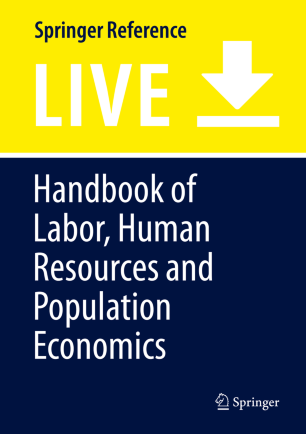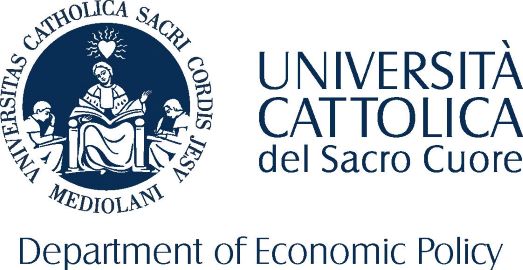Organized by POP@UNU-MERIT, GLO & Università Cattolica del Sacro Cuore and hosted by UNU-MERIT, Maastricht, an Online Workshop on “Technological Change, Employment & Skills” will take place on June 7, 2021, 2.00 – 6.00 pm CEST/Maastricht/Dutch time. The workshop presents the core findings of 10 chapters of the 20 review articles of the section on ‘Technological Changes and the Labor Market’ in the Labor, Human Resources and Population Economics Handbook supported by the GLO and published by Springer Nature. The event is motivated by the attempt to review and discuss the general findings and the state-of-the-art in the economics and business literature.
Below you find an introduction to the Handbook Project, the detailed Workshop Program (PDF) and a listing of the 20 Handbook Chapters with links to access them on the Springer Nature website.
No advanced registration needed.
Zoom Link: https://maastrichtuniversity.zoom.us/j/92175077007
The Handbook Project

The Handbook in “Labor, Human Resources and Population Economics” provides an integrated picture of knowledge about the economic and social behaviors and interactions of human beings on markets, in households, in companies and in societies. A fast evolving project by the GLO with a core basis in labor economics, human resources, demography and econometrics, it will provide a large and complete summary and evaluation of the scientific state of the art. Chapters are developed under the guidance of an engaged team of editors led by the GLO President administered in 30 sections.
See LINK for more details
- to examine the already available chapters, and
- to find out how to contribute to this exciting venture with an own chapter.
The Section “Technological Changes and the Labor Market” is directed by Marco Vivarelli, who is also the GLO Cluster Lead of the “Technological Change” area. The Section is just completing its set of 20 published papers now available for use, review and debate.
Workshop: Technological Change, Employment and Skills. June 7, 2021
Program PDF
Moderator: Michaella Vanore (UNU-MERIT & GLO)
14:00 Opening Remarks
Welcome: Neil Foster-McGregor (Deputy Director, UNU-MERIT)
Introduction: Klaus F. Zimmermann (UNU-MERIT, Maastricht University & GLO; Editor of the “Handbook of Labor, Human Resources and Population Economics”)
14:15 Aims and Scope
Marco Vivarelli (Università Cattolica del Sacro Cuore & GLO; Editor of the Section: Technological Changes and the Labor Market”)
14:30 Technology and Work: Key Stylized Facts for the Digital Age
Mario Pianta (Scuola Normale Superiore & GLO)
14:45 Innovation, Technology Adoption and Employment: Evidence Synthesis
Mehmet Ugur (University of Greenwich)
15:00 Innovation, Employment, and the Business Cycle
Bernhard Dachs (AIT Austrian Institute of Technology)
15:15 Technological Innovations and Labor Demand Using Linked Firm-Level Data
Eva Hagsten (University of Iceland)
15:30 General Discussion Introduced by Alessio Brown (UNU-MERIT & GLO)
16:00 Coffee/Tea Break
16:15 AI and Robotics Innovation
Daniele Vertesy (Joint Research Center & GLO)
16:30 Robots at Work: Automatable and Non-automatable Jobs
Grace Lordan (LSE)
16:45 Why do Employees Participate in Innovations? Skills and Organisational Design Issues and the Ongoing Technological Transformation
Nathalie Greenan (Conservatoire National des Arts et Métiers & GLO)
17:00 Skill-Sets for Prospective Careers of Highly Qualified Labor
Dirk Meissner (HSE University)
17:15 Quantity and Quality of Work in the Platform Economy
Dario Guarascio (Sapienza University of Rome & GLO)
17:30 General Discussion Introduced by Pierre Mohnen (UNU-MERIT & GLO)
18:00 Conclusions
Marco Vivarelli and Klaus F. Zimmermann
Handbook Section “Technological Changes and the Labor Market“
The Handbook of Labor, Human Resources and Population Economics
Editor: Klaus F. Zimmermann
Section – Technological Changes and the Labor Market
Marco Vivarelli, Section Editor
Università Cattolica del Sacro Cuore
Department of Economic Policy, Milan, Italy
Note: Find abstract links of the articles below the chapter titles.
Testing the Employment and Skill Impact of New Technologies
Laura Barbieri, Chiari Mussida, Mariacristina Piva, Marco Vivarelli
Università Cattolica del Sacro Cuore
Innovation, technology adoption and employment: Evidence synthesis
Mehmet Ugur
University of Greenwich Business School
Technology and Work: Key Stylized Facts for the Digital Age
Mario Pianta
Scuola Normale Superiore
The Digital Transformation and Labor Demand
Flavio Calvino, Vincenzo Spiezia
Organisation for Economic Co-operation and Development (OECD)
Digitization and the Future of Work: Macroeconomic Consequences
Melanie Arntz1,2, Terry Gregory3,1, Ulrich Zierahn5,1,4
1 Leibniz Centre for European Economic Research, 2University of Heidelberg, 3Institute of Labor Economics, IZA,4CESifo Research Network, 5Utrecht University
AI and Robotics Innovation
Vincent Van Roy, Daniel Vertesy, Giacomo Damioli
European Commission
Robots at Work: Automatable and Non-automatable Jobs
Cecily Josten, Grace Lordan
London School of Economics
Innovation, Employment, and the Business Cycle
Bernhard Dachs1, Martin Hud2, Bettina Peters2,3
1AIT Austrian Institute of Technology, 2Leibniz Centre for European Economic Research, 3University of Luxembourg
Technological Innovations and Labor Demand Using Linked Firm-Level Data
Martin Falk1, Eva Hagsten2
1USN School of Business, 2University of Iceland
Why do employees participate in innovations? Skills and organisational design issues and the ongoing technological transformation, in production
Nathalie Greenan, Silvia Napolitano
Conservatoire National des Arts et Métiers
Technologies and “Routinization”
Federico Biagi1, Raquel Sebastian2
1European Commission, 2Universidad Complutense de Madrid
Skill-Sets for Prospective Careers of Highly Qualified Labor
Natalia Shmatko, Leonid Gokhberg, Dirk Meissner
National Research University Higher School of Economics,Moscow
Quantity and Quality of Work in the Platform Economy
Francesco Bogliacino1, Cristiano Codagnone2,3, Valeria Cirillo4, Dario Guarascio5
1Universidad Nacional de Colombia, 2Università degli Studi di Milano, 3Universitat Oberta de Catalunya, 4INAPP, National Institute for the Analysis of Public Policies, 5Università degli Studi di Roma
Digital Platforms and the Transformations in the Division of Labor
Ivana Pais
Università Cattolica del Sacro Cuore
Innovation and Self-Employment
Tommaso Ciarli, Matthia Di Ubaldo, Maria Savona
University of Sussex
The Present, Past, and Future of Labor-saving Technologies
Jacopo Staccioli, Maria Enrica Virgillito
1Università Cattolica del Sacro Cuore, 2Scuola Superiore Sant’Anna
Robots, Structural Change, and Employment: Future Scenarios
Ben Vermeulen1, Andreas Pyka1, Pier Paolo Saviotti2
1University of Hohenheim, 2Utrecht University
The Role of Innovation in Structural Change, Economic Development, and the Labor Market
Önder Nomaler, Bart Verspagen
UNU-MERIT, Maastricht
Integration in Global Value Chains and Employment
Filippo Bontadini1, Rinaldo Evangelista2, Valentina Meliciani3, Maria Savona1
1University of Sussex, 2University of Camerino, 3University Luiss Guido Carli
Employment Impact of Technologies in the Developing World
Arup Mitra1, Chandan Sharma2
1South Asian University, 1Indian Institute of Management Lucknow
*****
Ends;



